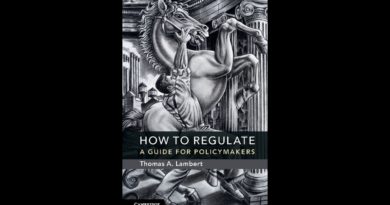Is it State aid to not sue Cartelists for damages? Public Inaction at the Age of Private Enforcement
If you haven’t been living under a stone for the past decade, you will know that private enforcement is now a big business, fueled by the
Damages Directive, and the industrious claimant side law firms. One key player is curiously absent in many Member States, namely the state itself. While public procurement markets are vulnerable to cartel behaviour – and in some cases to excessive pricing abuses – governments are oddly missing from the dockets of the courts when it comes to a follow-up action for damages. Why is this the case? Do not all government agencies have a fiduciary responsibility to protect the money of tax payers? If the government does indeed waive these claims passively, isn’t this illegal State aid given to the cartels? This article examines whether inaction by the government constitutes illegal State aid. The article examines the intersection between State aid control and private competition enforcement, based on CJEU case law. The article reveals a legal environment that allows public bodies to act, not just to deter, but also to avoid violating their Treaty obligations. A legal environment that favors government claimants
––
Are conditions of Imputability & State Resources satisfied?–
For an action to be considered State aid, the state must have the resources to grant it. These criteria ensure only actions and financing of the state fall under State aid rules. The conditions are likely to be met if contracts are awarded and financed centrally, regionally or locally by any government entity. As for attribution, it becomes more complicated when the victim is a public enterprise – such as a private company controlled and owned by the member state. Imagine, for example, a state-owned utilities company that holds tender procedures in accordance with the Utilities Directive
. Could the Member State be held responsible for the company’s failure in suing bid riggers? Would this be a measure that would qualify as State aid if the company failed to sue the bid riggers?
As for public undertakings, the case-law as reflected in the
Notion of Aid Notice provides a set of “
indicators for imputability” which include very vague factors such as an assessment of “
the presence of factors of an organic nature which link the public undertaking to the State”.
A considerable element of uncertainty therefore remains on this question. The Advantage Condition – Inaction vs. Action–
A central issue is whether government inaction, i.e. The failure to sue a defendant for damages can be equated to a “measure” that amounts to State aid. It is a question of whether “doing nothing” qualifies as an advantage. The CJEU and European Commission have accepted for a long time that waiving revenues
is an act of transfer of state resources. The Notion of Aid Notice states:–
But based on the principles that underpin the Market Economy Operator (MEO), the standard isn’t whether the government did anything
And, importantly, where there is a presumption that harm has occurred and defences such as pass-on become moot, it is important to provide a robust justification for inaction. In such situations, a private operator may conclude: “I have all the cards–why would I not sue?”–
–
What is Selectivity?–Finding State Aid requires that the benefit granted through state resources “favours certain enterprises or the production”
–known as the’selectivity criterion’. Selectivity is likely to be met unless the Member State has a policy of not pursuing (competition-related) damages claims. Even if this policy exists, you could still argue for selectivity. […] Another interesting aspect is the interaction with the requirement for joint and several liability, as required by Article 11 of Damages Directive. Could the companies being sued argue (redress aside), that those not sued were selectively favored? The Market Economy Operator test could be applied again.
…and Distortion in Competition & Effects on Trade?…Only measures which threaten to distort the competition and are likely to affect trade between Member States qualify as state aid. The Notion of Aid Notice states that, in order to avoid a distortion of competition the beneficiary must be relieved of the expenses that it would have otherwise had to incur during its daily business operations. This is a pretty low standard. As to the effect on intra-EU trading, the Notion of Aid Notice states that this does depend on the traditional definition of a market. Although the intra-EU trade assessments made under Articles 101 TFEU versus 107 TFEU in principle are distinct, it is harder to find State Aid in cases where a NCA bases their decision solely on the domestic equivalent of Article 101TFEU rather than Article 101TFEU itself. In cases of local bid rigging, for example, for a construction contract at a municipality school. The Commission’s decision in March 2025,
SA.108990-Valchiavenna, shows the very strict standard to exclude State aid based upon the intra-EU trading condition. 11001010 11001010Agreed penalties: A forward-looking tool They may even adopt a proactive approach, like many multinational companies do in their procurement departments, by adopting clauses of agreed penalties that are triggered if the contractor is found to have colluded. For example, a standard provision could require that the contractor pay 15 % of contract value in liquidated damages, if a court or competition authority finds that he violated competition laws on the relevant market during the time period relevant to the contract. This ‘agreed-upon-penalty’ approach would eliminate the need to prove overcharging and at least reduce the arguments about pass-on. Even in jurisdictions that review such clauses for fairness and equity, they would make it easier to pursue successful follow-up actions.




